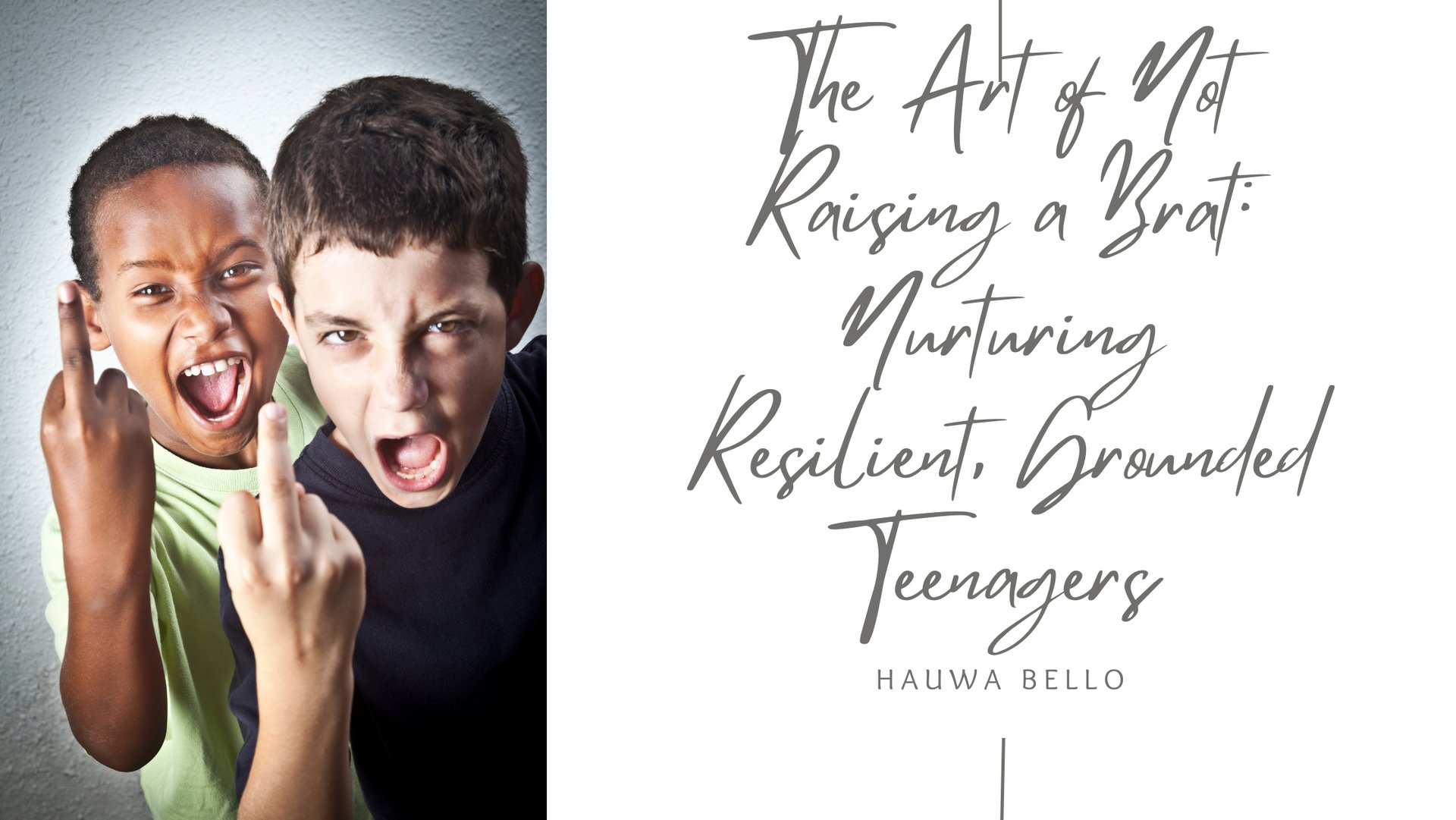The Art of Not Raising a Brat: Nurturing Resilient, Grounded Teenagers
In this insightful blog post, we explore the delicate art of parenting, focusing on how to avoid raising entitled children while nurturing resilient, grounded teenagers. Drawing from personal experiences and expert advice, including insights from Dr. John Gottman’s research, this post delves into the warning signs of entitlement and provides practical strategies to foster responsibility, emotional intelligence, and a strong sense of purpose in your children. Whether you're navigating the challenges of raising teens in an affluent environment or simply want to instill core values like humility and compassion, this guide offers valuable tips to help you raise well-rounded, happy, and balanced individuals.
Hauwa Bello
8/15/20245 min read


Parenting is an art, one that requires a balance between love, discipline, and the wisdom to navigate the complexities of raising children in today’s world. As a mother and a mental health professional, I’ve encountered many challenges, both personally and through the experiences of other parents. One that stands out is the danger of raising entitled children, or as some might put it, "raising a brat."
It’s easy for children to develop a sense of entitlement, especially in a world where instant gratification is often just a click away. But this entitlement can quickly morph into a lack of respect for others, poor resilience, and a distorted view of their responsibilities to themselves, their families, and society.
Recognizing the Warning Signs
The first step in preventing entitlement is recognizing the warning signs. Experts warn that overly indulged children can develop a toxic combination of traits:
Constant Demands: If your child insists on getting what they want, when they want it, without any regard for others' needs or timing, this is a sign of entitlement. Believing they deserve special treatment simply for existing. They might think, "The rules don’t apply to me."
Lack of Gratitude: If your child rarely, if ever, expresses thanks for what they receive or takes what they have for granted, this is a serious concern.
Manipulative Behavior: If your child resorts to emotional manipulation—such as throwing tantrums, guilt-tripping, or refusing to comply until their demands are met—they may be developing a sense of entitlement.
Inability to Handle Disappointment: Children who can’t cope with not getting their way or who overreact to minor setbacks may lack the resilience needed to navigate life’s challenges. Having been shielded from adversity, even minor setbacks feel catastrophic. They might say, "My life is ruined!" at the first sign of trouble.
Lack of Motivation and Purpose: When every need is met without effort, there’s no drive to achieve anything independently. The attitude becomes, "Why should I work for it?"
Disconnect from Reality: Some children become oblivious to the everyday struggles of ordinary people, thinking, "It’s not my problem. They should just get a job."
Giving Up Easily: If they don’t experience success right away, they quit.
These warning signs are particularly concerning among teens from affluent, well-educated families. On the surface, they may seem to have it all, but underneath, there can be profound unhappiness, anxiety, and even substance abuse issues, encased in the bubble of privilege.
The Art of Raising Resilient, Grounded Teenagers
Raising children who are grounded and resilient doesn’t happen by accident. It requires deliberate, thoughtful parenting. Here are some strategies, supported by parenting researcher Dr. John Gottman’s principles, to help prevent entitlement and foster a sense of responsibility and resilience in your children:
Teach the Value of Hard Work and Responsibility: Children need to understand that privileges are earned, not given. Assign them age-appropriate chores and responsibilities, and ensure they understand the connection between effort and reward. For example, rather than giving them an allowance simply because they exist, tie it to completing tasks or achieving goals. Dr. Gottman emphasizes the importance of assigning meaningful work, like chores or a summer job, to instill a strong work ethic.
Validate Emotions Over Achievements: It’s crucial to emphasize that love is not contingent on perfection. Praise character and hard work over appearance and results. Let them know, "You don’t have to be perfect to be loved."
Discover Purpose: Help your children find a path to purpose. Engage them with questions, share stories of people living with purpose, and support their interests. Start fanning the sparks you see in them. Dr. Gottman suggests that parents can help teens find purpose by processing their interests and passions with them, guiding them toward meaningful pursuits.
Build Emotional Intelligence: Develop their emotional intelligence through Emotion Coaching, a key predictor of success. Teach them to understand and manage their emotions, which will serve them well in all aspects of life. According to Gottman’s research, building emotional intelligence is vital for long-term success and happiness.
Set Boundaries and Enforce Consequences: Learn how to set limits with teens while giving them space to explore and make decisions on their own. Consistent boundaries teach respect and responsibility.
Make Sleep a Priority: Encourage 8-9 hours of sleep a night. Adequate rest is crucial for growing brains and overall well-being.
Promote Problem-Solving Skills: Resilience is built through facing challenges and overcoming them. Rather than shielding your child from difficulties, encourage them to solve problems on their own. This helps them develop the grit needed to persevere even when things don’t go their way.
Encourage Community Service: Expose them to different ways of life and communities through volunteering. This cultivates empathy and gratitude, helping them open themselves up to those who are different from them. Gottman’s research highlights the importance of encouraging teens to engage in community service, as it helps them develop empathy, compassion and a broader perspective on life.
Be Emotionally Present: Your attention and care mean more than any material possession. The most important resource you can offer your children is emotional and relational wealth. Gottman’s studies suggest that emotional presence and attunement are more valuable than any material advantage you could give your child.
A Personal Anecdote
I’ll never forget the day my son, in a moment of frustration, blurted out, “I didn’t ask to be born!” It was a statement that caught me off guard, but it also provided an opportunity for a teachable moment. Yes, children don’t ask to be born, but once they are here, they have responsibilities—to themselves, to their family, and to society. This was a conversation that quickly turned into one of my classic motherhood pep talks, sprinkled with a bit of humor and, admittedly, some mild maternal blackmail. But it drove home an important point: life isn’t just about what we want; it’s about what we give and how we contribute to the world around us.
During one of my "Advancing Your Emotional Intelligence" masterclass sessions, a mother asked how she could get through to her son, who refused to do anything unless all his demands were met first. Her question revealed an underlying issue—an entitled child and an overwhelmed mother. The solution begins with reclaiming parental authority and reestablishing the balance of power. This involves setting clear expectations, enforcing consequences, and gradually teaching the child that life is a series of give-and-take interactions, not a one-sided fulfillment of desires.
So,
The paradox is that the privilege meant to give kids a head start in life can become anchors weighing them down. By keeping them grounded in core values like resilience, humility, and compassion, parents can raise happy, balanced youth. Gottman’s research highlights that emotional coaching, attunement, nurturing, and providing guidance are vital for all children, regardless of socioeconomic status. Privilege devoid of these elements risks producing youth who are emotionally adrift despite material abundance. Remember, relational and emotional wealth is always more precious for your child than any material wealth. By being emotionally present, setting boundaries, and fostering a sense of purpose, you can raise grounded, resilient individuals prepared for life’s tests.
Subscribe to our Blog
Subscribe to our blog for valuable resources on mental health, self-care, and personal development. Get insightful content to navigate mental health complexities and receive updates on new posts. Join our supportive community to discuss and learn about critical mental health topics.
Start your journey to a healthier, happier life by subscribing today!

